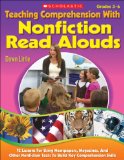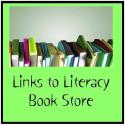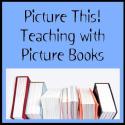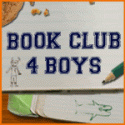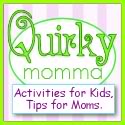Today’s guest post is by Julie Niles Petersen of www.Twrctank.com “TWRC” stands for Think, Wonder, Reflect, and Connect. At www.twrctank.com Julie blogs about the intricacies of teaching reading. Her blog is extremely informative and she provides a ton of resources that are helpful to educators and parents, alike. After having only known Julie for several months on Twitter, I had the pleasure of meeting her IRL at the International Reading Association’s Annual Convention in Chicago this year. What fun we had! In addition to the TWRCtank, Julie can be found on Facebook and on Twitter (@twrctankcom), where she is a valuable source of reading information and part of my PLN (Personal Learning Network). When I asked her to provide me with a guest post for The Literacy Toolbox this month, she came through in spades when she wrote this fantastic article, filled with numerous resources, explaining why and how to motivate readers.
I think children who do not struggle with decoding the words can find reading boring for many reasons. Here are three of them:
- They have not found the right book. The right book would be one that interests them for some reason. Some reasons may be they like the topic, author, genre, or need to find an answer to a problem. Reading about things of no interest is boring.
- Their limited word and world knowledge makes many texts too difficult to understand because they cannot connect the dots (i.e. the necessary inferences required to understand). Reading without comprehension is boring!
- They are so used to reading not making sense, that they do not put much energy into making it make sense. Without TWRCing (thinking, wondering, reflecting, and making connections) while you read, reading is boring.
Suggestions for Children Who Do Not Struggle with Decoding, But Think Reading Is Boring
- Be sure to TWRC with your children as much as possible and not just when you are reading.(“TWRC” rhymes with “work” and stands for think, wonder, reflect, and connect.) The more you model good TWRCs, the more your child will see how dots are connected. Further, great TWRCs lead to great thinking and more engagement.
- Help your children improve their vocabulary. This topic is beyond the scope of this blog. However, if you look on the right-hand side of my blog and scroll down, you will find the heading, “External Link Categories.” Then, you can find some more information about vocabulary under the subheading, “Vocabulary.” A sure way to help improve their vocabulary is by discussing the meanings of unfamiliar books while you read aloud to your child. As mentioned in part one of this post, be sure your children have student-friendly dictionaries close to them when they read.
- Ask your children, “If you could be an expert at anything, what would it be?” I heard somewhere that if you study a topic for 10-15 minutes each day, it will help you become an expert. I have read about teaching reading for more than 10 – 15 minutes almost every day since I began the master’s program in reading. Although I wouldn’t really call myself an expert, I feel confident in talking with those who are (and I really enjoy it, too!)My point? The drive to become an expert on something is pure self-motivation. If your children want to be experts on dinosaurs, ask teachers, librarians, and those who work in bookstores to help you find a lot of reading material on dinosaurs. Look for great websites and blogs on the topic, too. Be sure to keep abreast with what your children learn and celebrate their new-found knowledge. Let them know when they start teaching you things, too! You may also want to introduce them to friends and family by something like, “This is my son, Bob. He is/is becoming an expert on dinosaurs.” That should invite conversation about what he reads, associating more positive feelings with reading.Here are two great quotations that are somewhat related to self-teaching:
The true university these days is a collection of books. ~Thomas Carlyle
If we encounter a man of great intellect, we should ask him what books he reads. ~ Ralph Waldo Emerson
You may also want to check out these links: Self-Education Resource List and 100 Amazing How-To Sites to Teach Yourself Anything.
- Let your child watch book trailers and listen to booktalks in order to discover good books.Book trailers and booktalks are similar to movie trailers and friendly recommendations because they try to entice you to check out the product. Think about it. How do you decide what movie you want to see? Are you more likely to go to the movie theater without knowing what you want to watch, or knowing what you want to watch? I would guess most people go to the theater knowing exactly what they want to watch and that they learned about it from a movie trailer or a friend’s recommendation. Thinking about reluctant readers, I would guess that many who do not have difficulty reading, are reluctant simply because they are not aware of good books. I know I was saddened by how many great books were unfamiliar to the struggling readers with whom I worked. My point here? We need to be sure reluctant readers know about good books–especially those that would be of interest to them.I first discovered book trailers from @KeithSchoch on Twitter when he shared this great post,“Coming Attractions: Book Trailers.” Since he shares so many good resources, I will not share any more. Let me just say that after reading his post, I thought, “Wow! Whoever began creating book trailers was a genius! They should benefit reluctant readers tremendously!”M. Dahms, another person I follow on Twitter, is passionate about booktalks, as am I, and she shared this post full of booktalk resources, “Reader’s Workshop Links: Booktalks.” Again, since she shared so many links I will not share anymore.I first learned about booktalks by Linda Gambrell at an International Reading Association convention. I am not sure why I hadn’t thought about giving them before, but I hadn’t. Instead of calling them booktalks, she calls them, “book blessings.” She mentioned that once you “blessed” a book, it usually flew off the bookshelf before the end of the day. I returned to the classroom and tried it out. She was right–they flew off the shelves.
If you are a teacher, I beg you to give booktalks in your classroom as often as possible. In addition, set aside some time for your students to give booktalks. The books my students “blessed” also became hot-ticket items.
- Find some great book review blogs and read them thinking about your child’s abilities and interests. If you do a Google search of “book review blogs” or “children’s book review blogs,”you will find many from which you can choose.
- Be sure to ask your librarian for recommendations. A knowledgeable librarian who knows your child’s interests and reading level is invaluable. (Teachers, this includes you, too!) I thought I knew a lot about what books were popular with students until I spoke with one librarian in particular, Barbara. Not only did she pay attention to what books were checked out the most frequently, but she considered it her mission to keep up with all the new books being published that she thought would be popular with our students. She was a real powerhouse of knowledge and the books she recommended for my struggling readers were always a big hit. I also really enjoyed reading what she recommended.
- Here are some websites that should help you find great books your children will enjoy:
- www.kidsreads.com This site also helped me learn about books that are popular with children. It is a fabulous website for students, parents, teachers, and librarians! Be sure to check out their about page which lists other websites in their network, such aswww.teenreads.com.
- The Series Binder. According to the site, it was “Created by the Webster Public Library Children’s department staff members, and maintained by users from all over the globe in order to help librarians, teachers, parents, and kids find the chronological and publication order of series books. The Children’s Series Binder seeks to create a comprehensive listing of series books for children ranging from toddlers to tweens.”After going to the Webster Public Library, I went to the “Parent’s Corner” page and then to,the “Books, Books, Books” page and I found a book search tool called NoveList. Although the website says, “NoveList will let you search for books by subject, grade level, and even number of pages,” I found so much more. The website also says that NoveList can only be used from computers at the library. It seemed to work just fine for me.
- www.guysread.com. This website was created by the very funny author, Jon Scieszka.According to the website, its mission is “to help boys become self-motivated, lifelong readers.” It is a great website with a great mission! Jon is on Twitter.
- Lexile.com’s Find a Book Feature. According to the website, you “Enter your Lexile measure, select your interests, and find books you’d like to read! Whether you’re reading for school or for pleasure, you can use this site to build a custom reading list on the subjects that interest you the most.” You actually do not need to know your child’ Lexile (a number that indicates an approximate reading level). You can search by your grade level (K-12). Even better, you can indicate whether your child finds grade level material, difficult, challenging, or easy.
- Reading Is Fundamental’s Book Search Feature. This is what the website says, “Whether you’re looking for a book for yourself or for children, you’ve come to the right place. Browse our booklists, or use the tool below to search our book database by title, author, category, age level, or keyword.”
- Mid-Continent Public Library’s Reading Advisory. Some of the things you can do on this website are: 1) Search their databases for movies based on books, 2) Search their databases for series books for kids and teens, 3) Read lists of award winning titles for kids, teens, and adults, 4) Read suggested reading lists for kids, teens, and adults, and 4) Discover useful links from other libraries.
- Scholastic’s Teacher Book Wizard Although this is designed for teachers, I think it could also be very helpful to parents. There is so much you can do here. Luckily, they have a video tour.
- The International Reading Associations’ Book Choices Lists According to the website, “Each year, thousands of children, young adults, teachers, and librarians around the United States select their favorite recently published books for the “Choices” reading lists.” The lists are annotated, meaning they give you a brief summary of the book. You can find the lists for the current year’s choices, as well as lists from previous years.
- StorySnoops. This website was recently started by four moms in California. Here is their description of how it works, “Created by moms, StorySnoops offers children’s book reviews from a parent’s perspective. Want to find fiction that interests your 9-18 year old? Curious about its content? Find it on our site and we’ll give you the scoop! We read it so you know what’s in it.” Some things I particularly like about this site are, 1) You can search by the gender of the main character–boys often do not like reading books where the main characters are girls, 2) You can search by suggested reading (ex. Books about Kids like Yours, Noteworthy Books, Our Absolute Faves, Thought-Provoking Books, etc.) and 3) Content Type (ex. Tolerance, Body Image, Teen Issues, Death, Race Ethnicity, and Prejudice, etc.)
- What Should I Read Next? According to the website, “Enter a book you like and the site will analyse our database of real readers’ favorite books (nearly 70,000 different titles so far, and more than a million reader recommendations) to suggest what you could read next. (You can register on the results page and build your own favorites list.)”
- The Book Seer. Enter the title and author of a book you liked and it will give you book recommendations from Amazon and LibraryThing.
Finally, here are some books you might like to read to learn more about great read alouds and helping your children find books that will keep their interest:
- The Read-Aloud Handbook by Jim Trelease
- Reading Magic: Why Reading Aloud to Our Children Will Change Their Lives Forever by Mem Fox
- The Book Whisperer: Awakening the Inner Reader in Every Child by Donalyn Miller aka @donalynbooks on Twitter
- Reading Ladders: Leading Students from Where They Are to Where We’d Like Them to Be by Teri S. Lesesne aka @ProfessorNana on Twitter
You can find part one of this post here.
How do you encourage reluctant readers?







